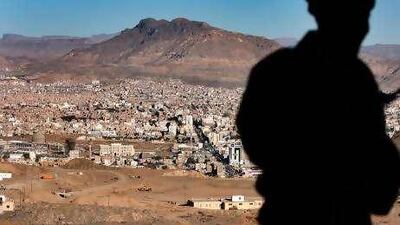The independent investigation team assessing complaints against the Arab-led coalition in Yemen has ruled in favour of international forces in a number of recent cases lodged by UN bodies and rights groups.
Mansour Al Mansour, the spokesman for the Joint Incident Assessment Team in Yemen, ruled in favour of the Arab coalition in seven cases submitted by the UN High Commissioner for Human Rights regarding an explosion on July 2015 on Al Wahat Mosque that it said killed 10 people and wounded 15 others.
He said that satellite imagery showed the mosque had been destroyed two months prior to the attack and questioned the details of the incident in question.
In a separate case brought by UNHCR, Mr Al Mansour said there was no evidence that coalition forces had intentionally targeted a wedding in the Bani Qais Area in Hajjah governorate. He said that video footage of the strike showed no wedding tent and instead the strike was carried out against a military target in a building.
The target was confirmed as a Houthi missile expert and although the footage showed that the building’s roof collapsed there was no indication of a wedding.
Mr Al Mansour said UNHCR and other bodies were welcome to oversee the evidence and be briefed on the reports issued by the JIAT.
______________
Read more:
Mukalla: The Yemeni city that defeated Al Qaeda and now needs the world's help
UN Yemen envoy to visit Sanaa, Riyadh and Muscat after Geneva talks setback
Yemen pro-government forces cut major Houthi supply route
______________
In a case brought by the International Committee of the Red Cross, the JIAT said that a single strike had been carried out on a vehicle transporting explosive material. The ICRC had accused the coalition of hitting a welding workshop and a higher institute of medical sciences.
The investigation into a case brought by Human Rights Watch that claimed coalition forces had hit a busy market showed that no air raids had been carried out near the village of Zabid at the time of the reported incident. HRW reported that 60 civilians had been killed and 155 injured in an explosion at Shaja’a market.
Mr Al Mansour also said that a claim by Human Rights Watch that coalition forces targeted a cultural centre in Saada with three bombs that killed 28 people and injuring three others was carried out against a military target with two missiles.
The spokesman said the coalition clearly had "the courage" to admit mistakes made in the war, pointing to the recent acceptance that civilians including children had died after a strike in Saada on August 9.
“The Joint Forces Command of the Coalition expresses regret over the mistakes, extends its sympathies, condolences and solidarity to the families of the victims and announces its acceptance of the results and findings of (JIAT)”, a coalition statement carried by the Saudi Press Agency said about the incident on September 1.
Mr Al Mansour said the JIAT, which is based in Riyadh, did not base decisions on speculation and that it enjoys independence from any political agendas.
The JIAT reviews battle reports, flight logs, intelligence, satellite images and flight footage to assess claims made against coalition forces in Yemen and presents reports on the findings to the force commanders as well as concerned parties.

